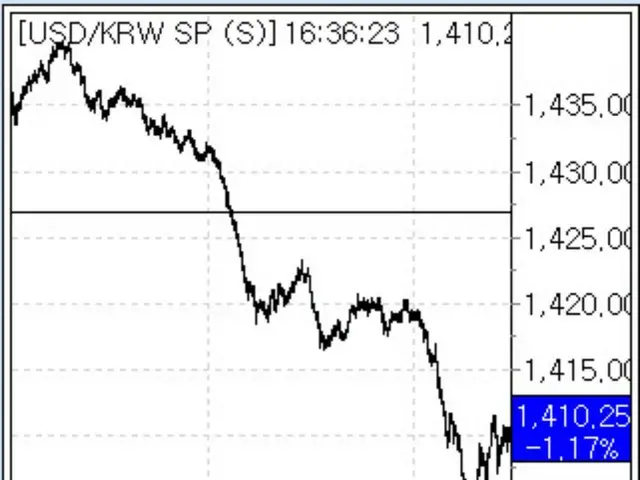According to MP Doctor, as of 3:30 p.m. on the 2nd, the exchange rate was 15.7 won lower than the previous trading day's closing price (1,421 won per dollar) at 1 dollar to 1.
The dollar closed at 405.3 won. On a closing price basis, it was the lowest price in about five months since the 1,402.9 won recorded on December 3, 2024, the day the state of emergency was declared.
The exchange rate on this day reflected the exchange rate outside the region, and trading began at 1,436.5 won per dollar, 15.5 won higher than the closing price of the previous trading day.
The rate continued to rise, reaching 1,440 won per dollar at around 9:35 a.m. But the exchange rate soon began to fall back, dropping below 1,430 won per dollar by midday.
The won-to-dollar trend continued into the afternoon. Just after 1 p.m., the won-to-dollar exchange rate fell below the 1,420 won level, and just before the close of trading it surpassed the 1,410 won-to-dollar level.
The market mood changed with the expectation that trade negotiations between the United States and China would begin. On the same day, US Secretary of State Rubio said, "China wants to have a dialogue on trade.
In response to a media question on this matter, the Chinese Ministry of Commerce said, "The United States has actively conveyed information to China on multiple occasions recently.
"We hope to start dialogue with China," he said. Until now, China had denied any talks with the United States, but on the same day, it admitted so.
But the two sides remain at odds over who wants to negotiate.
In response, the renminbi turned sharply bullish, with the dollar-renminbi exchange rate falling from 1 dollar to 7.27 at the start of trading to 1 dollar to 7.24 during trading.
The dollar's strength also appears to have leveled off. The dollar index was at 99.94 as of 3:27 a.m. on the 2nd. Meanwhile, the yen is weakening, with the yen/dollar rate remaining at the 145 yen level.
At the beginning of the market, anxiety over domestic politics in South Korea rose again, but the market gradually stabilized. Kim Bum-seok, acting Minister of Strategy and Finance, said on the same day, "The increased political uncertainty has led to a rise in the stock price.
"We will continue to take emergency measures in real time to minimize the negative impact on the financial and foreign exchange markets."
Foreign investors showed a net selling advantage in the domestic stock market, and the exchange rate
Foreign investors sold more than 160 billion won (US$150 million) on the KOSPI market, while the KOSDAQ market sold only 700 billion won (US$150 million).
The US non-farm employment index for April will be released around 9:30 pm Korean time on the same day. If the tariff policy has an impact on the market,
If employment falls more than expected, it could increase concerns about a slowdown in the U.S. economy and lead to further fluctuations in exchange rates during overnight trading.
2025/05/03 07:09 KST
Copyrights(C) Edaily wowkorea.jp 107

